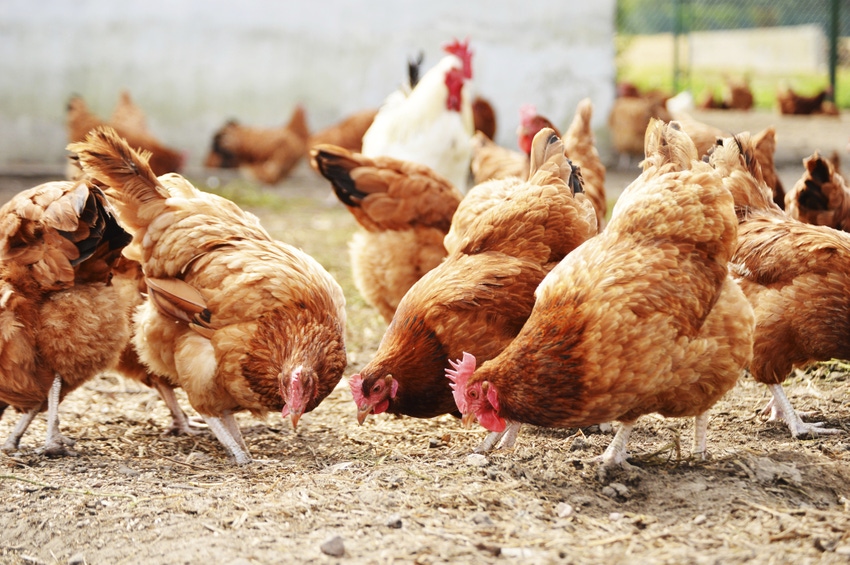USDA puts final ax on organic livestock rule
Organic trade group will continue to fight the rule in court and said it's needed to maintain integrity of organic seal.

The U.S. Department of Agriculture announced Dec. 15 its intent to withdraw the Organic Livestock & Poultry Practices (OLPP) final rule. The rule was finalized in January 2017 but placed on hold when the new Administration took office.
In mid-November, the agency had suggested that it would re-evaluate the rule and was extending consideration of the rule until May 14, 2018. The latest action formally terminates the rule.
The organic livestock rule, initially proposed in April 2016, adds new provisions for livestock handling and transport for slaughter and avian living conditions and expands and clarifies existing requirements covering livestock care and production practices.
In withdrawing the rule, USDA determined that the regulation exceeded the agency's authority and that it would have had a greater economic impact on farmers than originally estimated.
The Organic Trade Assn. (OTA) has been a widespread supporter of the OLPP rule. After months of delay, it has even decided to sue USDA in order to require the agency to move forward on the rule, which was sought to help bring increased integrity to the voluntary organic label.
In a statement following Friday’s announcement, OTA said it was “dismayed” at USDA's action.
“This groundless step by USDA is being taken against a backdrop of nearly universal support among the organic businesses and consumers for the fully vetted rules that USDA has now rejected. By the department’s own count, out of the more than 47,000 comments the department received in the last public comment period for the regulation, 99% were in favor of the rule becoming effective without further delay on Nov. 14. USDA noted that of those 47,000 comments, only 28 supported withdrawing the rule,” OTA chief executive officer Laura Batcha said.
Batcha noted that consumers trust that the organic seal stands for a meaningful difference in production practices. “Most striking is the Administration’s continued confusion that organic standards are mandatory rather than voluntary,” she added. “Farmers, ranchers and businesses choose to be in the organic marketplace, and Congress intended that industry and consumers work together to develop organic standards. This action undermines that goal.”
National Farmers Union senior vice president of public policy and communications Rob Larew said there currently is too much inconsistency in how organic certifiers apply animal welfare standards to farming and ranching operations. “This, in turn, endangers the organic label’s integrity and leads to consumer confusion. The OLPP rule would have helped mitigate these concerns by standardizing organic livestock and poultry practices for the voluntary National Organic Program,” he said.
However, the rule has not been supported universally. Many commodity groups, such as the National Pork Producers Council (NPPC), National Cattlemen’s Beef Assn. and even larger organic businesses, voiced opposition to the rule's stipulations and cos without providing further animal welfare benefits.
NPPC raised a number of issues with the regulation, including animal and public health concerns and the fact that animal production practices have nothing to do with the basic concept of “organic." NPPC also said the standards would have added complexity to the organic certification process, creating significant barriers to existing and new organic producers.
NPPC president Ken Maschhoff, a pork producer from Carlyle, Ill., thanked Agriculture Secretary Sonny Perdue and the Trump Administration "for listening to our concerns with the rule and recognizing the serious challenges it would have presented our producers."
OTA has turned to the courts to uphold organic standards. In anticipation of USDA’s continued attempts to kill the OLPP regulation, OTA filed an amended complaint in federal court last Friday.
“We will continue our fight to uphold organic standards that this Administration continues to willfully ignore by repeatedly delaying this fully vetted and final voluntary organic standard and now proposing to withdraw it. We will see the department in court and are confident that we will prevail on this important issue for the organic sector,” Batcha said.
The withdraw notice, which will be published in the Federal Register the week of Dec. 18, is subject to a public comment period.
About the Author(s)
You May Also Like





